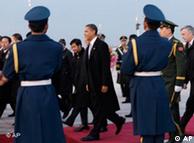德语媒体 | 2010.01.23
从谷歌事件看美国“悄声外交”
《明镜周刊》在文章中写道:"这是一种精心策划的大范围钓鱼攻势,使用互联网的人会不知不觉地把间谍软件下载在自己的电脑上,个人密码和其它敏感数据以后就会被人窃取。这样,攻击者就可以拦截对方的电子邮件、甚至撬开银行帐号。
'曙光女神'行动只是最近一次来自中国的进攻,其技术达到了迄今为止的最高水平。自九十年代中期以来,全球的企业和政府部门经常发现这样的网络攻 击,它们猜测,肇事者在中国。去年,加拿大科研人员在1200台受到渗透的国际电脑上发现了所谓的'鬼网'。进攻者特别感兴趣的是达赖喇嘛及其对中国的政 策以及自由西藏运动。
德国总理府和德国外交部也经常是网络攻击的目标。2007年夏季,默克尔总理前往中国访问前,网上间谍尤其关注德国总理到中国后将谈的问题。
而此次的新问题是,谷歌将会如何以攻击姿态指责中国政府支持这些对网络的进攻。谷歌发言人奥伯贝克说,我们有充分证据证明这些攻击来自中国。进攻者 除了对异议人士、显然也对自由西藏运动特别注视。他们打开了一名20岁的藏族女大学生的谷歌电子信箱,这位女大学生在斯坦福大学学习,积极投身自由西藏运 动。"  Bildunterschrift: Großansicht des Bildes mit der Bildunterschrift: 奥巴马访问北京时采取了“悄声”策略
Bildunterschrift: Großansicht des Bildes mit der Bildunterschrift: 奥巴马访问北京时采取了“悄声”策略
《星期日法兰克福汇报》发表评论文章认为,"谷歌这件事也给政界上了一堂课。不能因为中国日益强大和重要,我们就背叛自己的原则":
"现在有这样的认识比任何时候都重要,这是因为可能成为超级大国的中国正在越来越努力地把自己的游戏规则带入国际社会。作为外交部长首次访问北京的 韦斯特韦勒就有所体验。他与中国外长杨洁篪会谈后,中国方面先不允许记者提问。德国强烈要求后,最终才允许提两个问题,不能再多。
谷歌的转变很可能伴随美国领导人的思想转变而来,谷歌显然事先与美国政府打过招呼。也许奥巴马发现,自全球化以来,从事世界政治的不仅有各国元首, 还有企业,两者都可能犯类似的错误。谷歌在中国实行网络自我检查,奥巴马访华时采用'悄声外交',至今看不出这一做法取得了成功。也许这样的认识将促成新 的对华政策:巧妙的外交政策和政治经济压力手段可以使中国对具体要求做出让步。与现在的谨小慎微相比,这也许是与这个新大国打交道的更佳方案。"
摘译:王羊
责编:石涛
本文摘自或节译自其它媒体
不代表德国之声观点
*****
China Rebuffs Clinton on Internet Warning
BEIJING — The Chinese Foreign Ministry lashed out Friday against criticism of China in a speech on Internet censorship made by Secretary of State Hillary Rodham Clinton, calling on the United States government “to respect the truth and to stop using the so-called Internet freedom question to level baseless accusations.”
Readers' Comments
Readers shared their thoughts on this article.
Ma Zhaoxu, a Foreign Ministry spokesman, said in a written statement posted Friday afternoon on the ministry’s Web site that the criticism leveled by Mrs. Clinton on Thursday was “harmful to Sino-American relations.”
“The Chinese Internet is open,” he said.
The statement by the Foreign Ministry, along with a scathing editorial in the English-language edition of The Global Times, a populist, patriotic newspaper, signaled that China was ready to wrestle politically with the United States in the debate over Internet censorship.
President Obama promised last year to start a more conciliatory era in United States-China relations, pushing human rights issues to the background, but the new criticism of China’s Internet censorship and rising tensions over currency valuation and Taiwan arms sales indicate that animus could flare in the months ahead.
Mrs. Clinton’s sweeping speech with its cold war undertones — likening the information curtain to the Iron Curtain — criticized several countries by name, including China, for Internet censorship. It was the first speech in which a top administration official offered a vision for making Internet freedom an integral part of foreign policy.
The debate over Internet censorship was brought to the fore in China last week when Google announced it might shut down its Chinese-language search engine, Google.cn, and curtail its other operations in mainland China if Chinese officials did not back down from requiring Google to censor search results.
Until now, the Chinese government had been trying to frame the dispute with Google as a commercial matter, perhaps because officials want to avoid having the dispute become a referendum on Internet censorship policies among Chinese liberals and foreign companies operating in China. On Thursday, He Yafei, a vice foreign minister, had said the Google dispute should not be “over-interpreted” or linked to the bilateral relationship with the United States, according to Xinhua, the official state news agency.
But in the aftermath of Mrs. Clinton’s speech, that attitude could be changing. Mrs. Clinton pointedly said that “a new information curtain is descending across much of the world” and identified China as one of a handful of countries that had stepped up Internet censorship in the past year. (Starting in late 2008, the Chinese government shut down thousands of Web sites under the pretext of an antipornography campaign.) She also praised American companies such as Google that are “making the issue of Internet and information freedom a greater consideration in their business decisions.”
The State Department had invited at least two prominent Chinese bloggers to travel to Washington for Mrs. Clinton’s speech, and on Friday the United States Embassy here invited bloggers, mostly liberals, to attend a briefing on Internet issues.
A White House spokesman, Bill Burton, said Friday that “all we are looking for from China are some answers.”
In its editorial, the English-language edition of The Global Times said Mrs. Clinton “had raised the stakes in Washington’s clash with Beijing over Internet freedom.”
The American demand for an unfettered Internet was a form of “information imperialism,” the newspaper said, because less developed nations cannot possibly compete with Western countries in the arena of information flow.
“The U.S. campaign for uncensored and free flow of information on an unrestricted Internet is a disguised attempt to impose its values on other cultures in the name of democracy,” the newspaper said, adding that the “U.S. government’s ideological imposition is unacceptable and, for that reason, will not be allowed to succeed.”
Articles on the Chinese-language Web site of The Global Times asserted that the United States employs the Internet as a weapon to achieve worldwide hegemony.
One big question is whether ordinary Chinese will, to any large degree, accept China’s arguments justifying Internet censorship. Although urban, middle-class Chinese often support government policies on sovereignty issues such as Tibet or Taiwan, they generally deride media censorship. That feeling is especially pronounced among those who call themselves netizens. China has the most Internet users of any country, some 384 million by official count, but also the most complex system of Internet censorship, nicknamed the Great Firewall.
Except in the western region of Xinjiang, which is only starting to restore Internet access after cutting service off entirely after ethnic riots in July, canny netizens across China use software to get over the Great Firewall while chafing at the controls.

沒有留言:
張貼留言